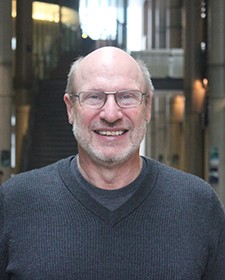【百家大講堂】第27期:Are We Building Smart Cities on Dumb Information Systems?
講座題目:Are We Building Smart Cities on Dumb Information Systems?
主 講 人:Mark S. Fox 教授(美國、加拿大兩院院士)
時 間:2018年4月20日下午14:00
地 點:中關(guān)村校區(qū)研究生教學(xué)樓101報告廳
報名方式:掃描下方二維碼
主辦單位:研究生院、自動化學(xué)院

【主講人簡介】

Mark S. Fox, 教授,加拿大多倫多大學(xué)工業(yè)工程與計算機科學(xué)杰出教授(distinguished Professor),計算機科學(xué)博士,美國人工智能協(xié)會會士(AAAI Fellow),加拿大工程院院士(EIC Fellow),長期從事智慧城市、本體工程、人工智能方面的研究。
Dr. Fox is a Distinguished Professor of Urban Systems Engineering, Professor of Industrial Engineering and Computer Science at the University of Toronto, and founding director of the Centre for Social Services Engineering. He received his BSc in Computer Science from the University of Toronto in 1975 and his PhD in Computer Science from Carnegie Mellon University in 1983. In 1979 he was a founding member of the CMU Robotics Institute as well as the founding Director of the Institute's Intelligent Systems Laboratory. He co-founded Carnegie Group Inc. in 1984, a software company that specialized in Artificial Intelligence-based systems. He was Associate Professor of Computer Science and Robotics at CMU from 1987 to 1991, In 1988 he was the founding Director of the Center for Integrated Manufacturing Decision Systems in CMU's Robotics Institute. In 1991, Dr. Fox returned to the University of Toronto where he was appointed the NSERC Industrial Research Chairholder in Enterprise Integration. In 1993, Dr. Fox co-founded and was CEO of Novator Systems Ltd., a pioneer in E-Retail software and services.
Dr. Fox pioneered the field of Constraint-Directed Scheduling within Artificial Intelligence and played a significant role in the development of Ontologies for modelling Enterprises. He was the designer of one of the first commercial industrial applications of expert systems: PDS/GENAID, a steam turbine and generator diagnostic system for Westinghouse, which was a recipient of the IR100 in 1985 and is still in commercial use at Siemens today. He was the co-creator of the Knowledge Representation SRL from which Knowledge Craft and ROCK, commercial knowledge engineering tools, were derived, and KBS from which several commercial knowledge based simulation tools were derived. His current research focuses on the ontologies, common sense reasoning and their application to Smart Cities. Dr. Fox was elected a Fellow of Association for the Advancement of Artificial Intelligence in 1991, was a Joint Fellow of the Canadian Institute for Advanced Research and PRECARN in 1992, and a Fellow of the Engineering Institute of Canada in 2009. Dr. Fox has published over 250 papers.
【講座摘要】
The advent of Smart Cities has seen an explosion of research, development and deployment of applications that take advantage of the convergence of technologies such as Artificial Intelligence, Web-based information systems, mobile technologies, and the Cloud. But lurking beneath these applications is a city-wide information system (Urban Operating System) whose architecture is rooted in the previous century. Just as cities have physical infrastructures that are over 100 years old, city operating systems are often legacy systems over 10-20 years old. Yet, the Urban OS is fast becoming the primary means by which citizens and corporations interact with the city. It is becoming the face of the city. How do we want to interact with the city? More importantly, how do we want the Urban OS to behave when the city and the Urban OS are the same? In this presentation we explore the question of how the future Urban OS should BEHAVE and not just how they are constructed.
